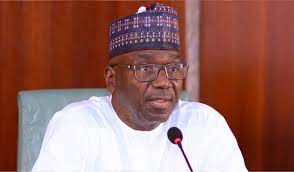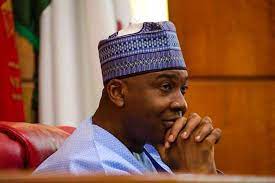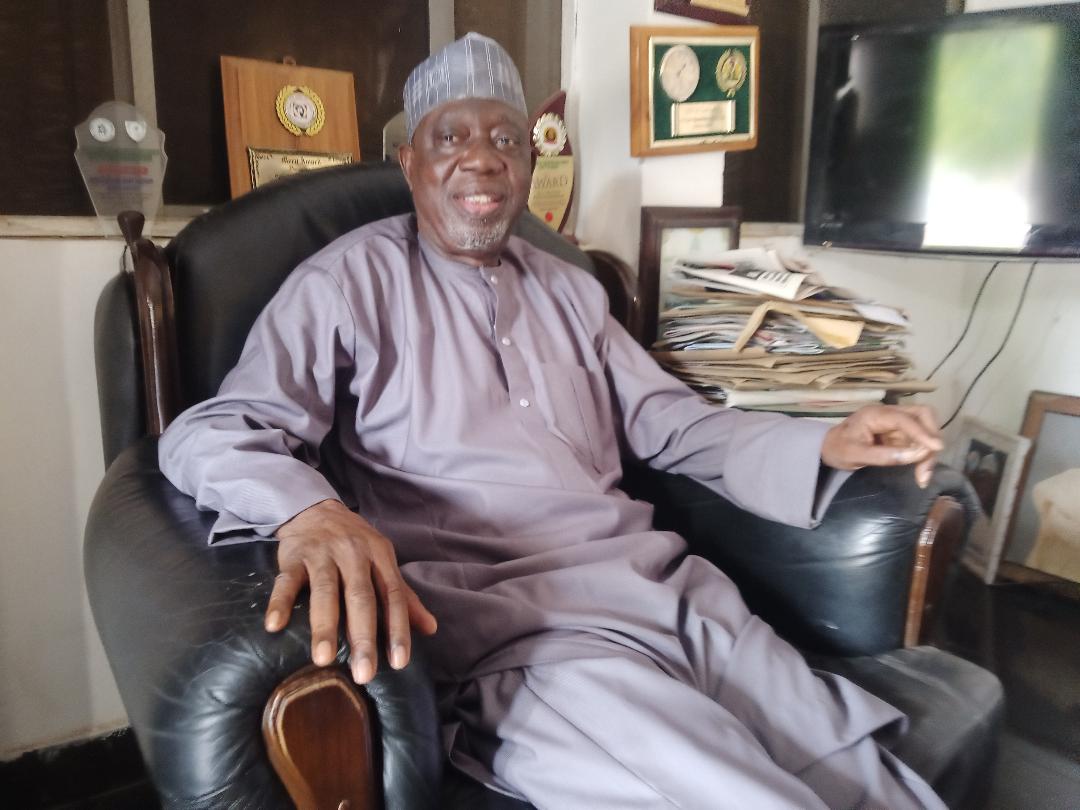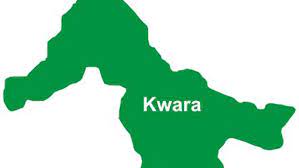My Understanding Of ‘Restructuring’…Why Nigerians Should Support CBN In Limiting Access To Cash-Ex-Gov Abdulfatah Ahmed
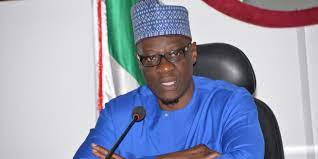
Alhaji Abdulfatah Ahmed, at different times , served as Commissioner for Finance and Commissioner for Economic Planning before becoming the sixth executive governor of the State of Harmony in 2011.
He is Governor Abdulrahman Abdulrazaq’s immediate predecessor.
Journalists including Team@orientactualmags.com sat down with the former Kwara state governor for an interview at his GRA, Ilorin residence on Monday.
Alhaji Abdulfatah Ahmed declared support for the recent policies announced by the Central Bank of Nigeria and urged Nigerians to support the steps taken to control access to cash by the apex bank while also asking journalists in the country to help emphasize the need to ensure the use of BVAS in the upcoming general election as planned by the nation’s electoral umpire; INEC.
He also accused the Abdulrazaq administration of veering off course in respect of the mission statements of IVTECH, Ajase-Ipo and the KWIRS.
Read On:
It has been a while, we have missed you and we are still missing you. What have you been up to?
Firstly, I welcome you all here. I’m very happy and delighted to see you. I’ve been out of office since 2019 and I’ve used the opportunity to really reflect on what I’ve gone through in the last 14 years. I started working, of course, as a public officer , I moved to the private sector after which I ventured into politics. That cumulatively had taken me more than 30 years , working and doing this and that.
In all these years, I’ve really just been moving from one level of activity to another, I’ve not really had time to sit down to reflect on how far I’ve come and where I am today and where exactly I want to see myself in the future. So that’s what I’ve been doing in the last 3 years. I have had the opportunity to sit down and reflect on what I’ve done in the last 3 and a half decades of my life. And I’m going to see how well I will be positioned for future expectations, and, between you and me, it’s becoming more refreshing because I’ve been able to assess things I had done and if I had the opportunity maybe I would have actually done the same thing or I would have done it differently. So these are some of the things I’m looking at and I hope to see myself using the information that I’ve garnered to reposition myself for the future.
Are we expecting you to return to politics anytime soon?
Between you and me, I’ve never really been out of politics but I’m not occupying a political office right now. But I’m available to take up any political appointment. Of course, obviously, I will not be going for an elective position but I’m readily available to take up any appointive position.
You left office as governor of Kwara state 3 and a half years ago, how will you assess the current administration in the state?
You see, I’ve always tried to review governance from a stepwise perspective and I begin to create measurability on the basis of what benefits are created for the majority of the people in the state. I know that governance is largely driven by policies that are driven from a consistent perspective because you are required to build infrastructure policies over a period of time.
And that requires that we have a system in place that would be seen from a continuity perspective. As it is today I see a lot of disconnect in respect of some of the policies that we put in place where we thought that people would have, by now, begin to benefit from. This disconnect usually leads to wastage because what has already been applied has not been taken to completion level where people can begin to benefit from. And again, you begin to see incongruity in application of policies and programmmes. And unless you are able to put a system in place where your policies are outlined to be seen to key into an existing policy, even though in a reformed perspective, but also has a way to connect with what you have met on the ground and adding to where you’re going.
That is how governance is carried on anywhere in the world. And that is how people benefit from programmes, i.e that’s how you see some programmes spanning over 3, 4, 5 administrations. You know, there are certain programmes you cannot complete within the lifespan of one administration. So if those policies are not clearly spelt out, shared and understood, you begin to see stoppages at different levels. Once a programme is not taken to completion, it amounts to waste of public resources. And wherever you see such programmes, in my own understanding is, when you meet a programme on the ground you review it and make it current and take it to the level that will be beneficial to the people. That’s how you can safeguard public funds. So, between you and me, I’ve seen so much inconsistencies in the way and manner policies and programmes are being carried out by the current administration in the state and I feel that there are ways that things could have been done better to give Kwarans a better sense of benefits through good governance.
Are you saying the current administration in the state does not have clear-cut objectives?
Well, I’m not saying they don’t have clear-cut objectives but I can’t see the nexus. For instance, in their health policy, with the health policy that they met on the ground, I’m not seeing a nexus , I have not seen a nexus between the education policy and the education policy that they met on the ground, it is the same story with regard to issues of the economy and infrastructure. And once you cannot create a nexus, you cannot create a connect, you cannot begin to see how the benefits will get to the people. I’m not saying that you must come and continue to repeat the same old programmes but there are ways that you can start new programmes that will key into the old programmes and we begin to see an improved benefits for the majority of the people.
Your Excellency, there was a political organization that had you as one of the main leaders and some had even called it the third force. This had made defection rumours swirled around you , are you still a member of the PDP?
Firstly, there was nothing like the third force. There was just an association of friends, well-wishers who share the same political understanding on how we could help to build our understanding ahead of the next dispensation. If you could recall, people were drawn from different walks of life; from the academia, political field and different areas, so that we could bring ideas on how to help drive programmes that will be woven around current challenges that we have in the country i.e what are we suggesting in respect of tackling insecurity ? What are we suggesting to solve the current economy issues?
What are we helping to contribute towards tackling youth unemployment? So the whole idea of the like-minded individuals coming together was to see how to come up with ways and manner in our own little way to add to whoever stands out as the prospective leader in this presidential race and between you and me, if you saw the group at that time we have some of us from PDP, we have people from APC, we have people from other parties.
It had nothing to do with the political parties that we belong to. We only came together for ideas on how to help the leadership of the country and how to move things forward. But by and large, to answer your question directly, I’m still a member of PDP and a strong stakeholder in Kwara State PDP.
The current administration in Kwara state had repeatedly lamented that it inherited ‘16 years of rots’, what is your take on this?
It is interesting that we have this administration that came on board through the use of propaganda, promoting things that were not correct. Fortunately, Kwarans are not toddlers, they can see for themselves. How can you say in the last 16 years you have met nothing on the ground but rots?
Is Ilorin the way it was 16 years ago? Or 16 years before they took over? In terms of the road network. Look at Post Office for instance, and look at the Offa Garage Ganmo Road that has been dualized. Asadam Road has been dualized. Was there a university before then? Was there a proper airport terminal at that time? Was there a renewed academic system for our secondary schools where new policies were introduced? Were there new campuses of the university in Kwara south and Kwara north? Was there a vocational training centre? Was there an aviation college? What about the five renovated general hospitals at five different locations in the state? Was there a well -structured programme on water project in such a way and manner that people don’t have to go more than five hundred meters to have access to potable water? Did we have that? Why would you say you met nothing on the ground ? You met everything and all you needed to have done was to add something to what had been done in 16 years but since you said you met nothing, what have you added?
You see , each time a new government comes, you’re not expected to come and do what you met on the ground, you are expected to come and do more than what you inherited. You have no business even talking about what you met on the ground and say whether it was done well or not. That’s cheap propaganda. What we expect you to do is to come and add to whatever you had inherited. Don’t forget, when I came on board in 2011, all the ongoing projects were completed on my watch. Not only ensuring that they were completed the funding system that was carried on under the bond was also taken to the latter and we ensured that those projects were completed and people began to benefit from them.
So I took the aviation college to completion. I took the diagnostic centre to completion. I took the Post Office overhead bridge and so many of those projects that we met on the ground to completion. Because we wanted to ensure that people benefited from them.
You now begin to see a situation where we initiated new programmes and our programmes were revolved around certain key areas that affect the people because we know that we don’t have the resources to do everything. So what we did was to prioritize human capital development. We looked at primary, secondary and tertiary education and we created levels of intervention at these three levels. My predecessor did a lot in primary education and we therefore concentrated on secondary and tertiary. We did not only restructure the managing agency; the ministry, so that it became current i.e by introducing Ministry of Tertiary Institution, we also introduced Ministry of Education and Human Capital Development so that we could bring a new sense of currency to the existing agencies of education.
We were looking at education beyond going to the four walls of school and learning. We wanted to convert our school from ‘ile iwe’ to ‘Ile eko’. So that you begin to see how we begin to move away from the traditional ways and that was what saw us bringing entrepreneurship training college to Ajase-Ipo because it’s not just about going to school and learning. Unfortunately that’s the kind of education system that we inherited. We inherited an education system whereby you’re taught and then you’re asked about what you were taught and you poured them out and you’re graded and it ends there. We have not made our education system functional and that was why we decided to create an entrepreneurship school, we begin to see skills and hands-on training being generated in a place like Ajase-Ipo International Vocational Training Institute. And the whole essence of it is not because we are oblivious of technical institutions within the state but we have seen that if you travel to any part of the world those who are hands-on are certificated internationally.
So we sought to partner with the C and G of London to create an avenue that will ultimately have our graduands getting certificated by them and they will become internationally exportable, not only useful to us but they can go to other parts of the world to work. That’s the essence of Ajase-Ipo college. I’m not sure if that spirit or focus is still being sustained. If you look at some of the things we did in respect of the economy, Kwara State being a civil service environment, a lot is dependent on government to stimulate the economy and that was why we created an SMEs programme and injected about N2 billion into it and we allowed people to access interest-free loans to drive their various businesses and these monies were channeled through the microfinance banks so that we use that to also make microfinance banks liquid so that they also participate in this SMEs programmes but they also used it to expand their own businesses and at the same time given people the latitude to access zero- interest loans to drive their businesses.
Those were ways and manners by which we sought to drive the economy of the state. Don’t forget that we came and we found out that there was so much reliance on allocation from the federal government. Of course, we knew that money was coming from the Federal Government but as soon as I came in as governor , there was a complete drop in the federal allocation. There were two options left, it was either I learn to create new money or I go somewhere to borrow. Now, in the option of borrowing, where does that leave us? It will leave the state to get more burdened because the little that’s not available will now be used to repay loans .
We saw that such a step was not going to work because it will affect the future of our coming generation. So we started to put on our thinking cap and we created the KWIRS, a new internal revenue agency to drive efficiency in collection and bring innovativeness to collection of taxes. And the first month we did it, we moved from N400m to N1.7b and within a period of 3, 4, 5 months we were getting N2b. Before I left office we had hit N3b in revenue for the state. And we became one of the most improved internally generated revenues in Northern Nigeria at the time we did it.
Now what was the purpose? Because that itself was only a means to an end. Now when we get this revenue, what does it translate into? It was on the premises of this that we say if we say we want to go and borrow money, we still will be burdened with the capacity to pay back. So we chose to create what we called Infrastructure Fund Kwara. It was a system we created by law in a way and manner by which monies are transferred from the internal revenue account into that account for the purpose of execution of capital projects and by law all those monies must be used for capital projects and any money that is sitting idle, that’s not due for payment should be invested in treasury bills.
So that was what created a pool of funds because on a monthly basis we were crediting the IFK account with about N500m and this, on quarterly basis, translated to N1.5b and this was used to pay contractors and made it easy for us to complete Anilelerin road, Share/Oke-Ode road, Rore road, we completed the underpass, we completed the two university campuses, we completed so many road networks within the state and also used it to jumpstart Kaiama-Kishi road, and most importantly we also used it for the Kwarapoly Road dualization project. So we did all these things without borrowing.
It was only through ingenuity by ensuring that we used our internally generated money. Because to borrow will require that you must have improved your capacity to repay. And when your capacity to repay has not improved and you keep borrowing, you’re mortgaging the future of your children. It is very simple. There is no rocket science about it. Except that you’re going to trade with the money. Maybe you borrow money, you make profits, you pay back and then you’re able to pay interest. Anything other than that, you’ll be jettisoning the future of the coming generation.
Has the mission statement of KWIRS
gotten sustained?
Obviously, they have veered off course completely because by now Kwara State should not be generating less than N5b monthly. Because the machinery to get to that level has been put in place. I’m sure you’re aware that we renovated the land administration Secretariat. That was part of the reasons why we did that. It was designed to create a one-stop shop for land administration. Not only to create efficiency but to also generate revenue. That leg of the revenue had not keyed into our revenue before we left. I saw a potential N2b monthly from that if it is properly executed and that would have taken us to a minimum of N5b monthly. With N5b, you have no business borrowing money. All you need to do is to create financial instruments something akin to what we did through IFK and you will see yourself carrying out projects accordingly without burdening the state with debts.
Only God knows what the size of the debts is. Only God knows how long these debts are going to be repaid, and only God knows what projects they’re going to be used for. So these are very serious issues and I think we must begin to ask questions. This is not partisan. We are Kwarans, we have a stake, and we must know because our children are here and we hope to have our grand children here, we all belong to this state. So we owe it to them to ensure that we follow up on things that have to be done rightly. We can’t pretend that these things are political and we just ignore it and say we don’t want to discuss it.
We must discuss it because it’s about the future of Kwarans. And don’t forget, if we refuse to take any action now in terms of adding our voice to the correctness of what supposed to be done then we should be ready to live with the consequences that come with it because life is about cause and effects. If you get it wrongly, you should be ready to live with the consequence that comes with getting it wrong. If you get it right, you live with that same consequence. It’s a choice and our choice is to voice out. And that is what we are doing.
IVTECH , Ajase-Ipo , has it met the vision of the founders? How has it fared under the current administration?
Answering this will be a bit difficult because they don’t share the vision for which the college was established in the first place and the vision requires that you must understand what role it is supposed to play in terms of developing people with regard to hands-on training programmes.
And what are the kind of expectations because by now I expect that graduands of that school should be available to either create jobs on their own or to be supportive of the current economy . But as it is now, they are not able to carry on to that level because they don’t share in the vision that gave birth to the school. That’s why we talk about continuity. Even if for any reason you have a different vision, you should be able to get your vision to be seen and understood by all. It’s not a secret matter. This is about governance. It’s for the public, not private. So people should know what is going on. As far as I’m concerned, I think the focus has been lost, as far as IV-Tech is concerned.
A few days ago, the Rector of IVTEC suggested the conversion of the college to a Diploma- awarding institution citing funding challenges. He added that doing this will allow the college to get support from agencies like TETFUND?
I agree with you. We deliberately refused to be moved to that angle of setting up another school that we were used to seeing. We have technical schools here and there. We have secondary schools here and there but this is a hands-on training institution. By the time you leave that school, we are expecting you to either start a business or you should be able to teach people business of the field you have chosen. Or better still , you should key into working system without supervision. So it’s not an academic- based institution. It’s a hands-on- based institution. And for now, you know that we don’t have diploma- awarding institutions that are truly hands-on -oriented in Nigeria except you get them certificated by external bodies i.e like C and G and we can begin to see hands-on training moving to certification level. Those other ones are individually owned. So if you say you are upgrading it to a diploma -awarding institution. Diploma by who? Diploma by the same set of institutions that we have, that we are moving away from, that we are trying to change a narrative by setting up a new place that will train hands-on people is like you’re still repeating cycles.
Ahead of the 1979 general election, we had Nigerians divided along religious and tribal lines, and we are having a repeat of this ahead of the 2023 general election, some have considered this as a worrisome development . You’re a statesman, do you entertain any fear?
Secondly, your party’s presidential candidate, Alhaji Atiku Abubakar, has said he would start restructuring on his first day in office if he gets elected as president. ‘Restructuring’ has been misrepresented and misunderstood by many , it however simply means organizing things differently. What aspects of our national life do you want restructured?
Firstly, the sliding of Nigeria into an ethno religious political terrain was deliberately done by mischief makers to use it as a punch line to drive their personal political interests. In reality we have never really been divided into slides and we have never really governed along those lines but at a point of looking for elective positions, people tend to use these punch lines to create divide and rule to drive their personal interests. So between you and me, I don’t belong to that school that would see either any sense of threats or would see any sense of discomfort arising from such feelings. As far as I’m concerned we have a political system in Nigeria that is peopled by people of different personalities and different religious background and where we defer is about ideology in respect of approach and ways to achieve good governance. And we have had situations where some have thrived, some have not thrived. The PDP has tried it, the APC is currently trying it , we have new parties that have not tried it and I think that Nigerians have been allowed to see things for themselves and separate the men from the boys.
In respect of what our presidential candidate said in Osun State where he had a fantastic outing and he touched on issues that have to do with restructuring , yes, you see restructuring as it were means different things to different people and I keep telling people that my understanding of restructuring is largely about driving compliances, ensuring respect for the rule of law , and then beginning to reduce the running of parallel systems so that we are a bit efficient where there are duplicities, reduce duplicities and you make it singular and functional.
These are all restructuring. So in my understanding of how restructuring should be seen is by looking at what are the areas where we have had waste of resources, what are the areas where there is duplication, what are the areas where there is inefficiency, what are the areas where we can improve but must not necessarily have to be done along religious or tribal lines at all. It might even have nothing to do with geography. It may have to do with governance and service delivery. So that’s why I said it means different things to different people. These are part of the things that it means to me and that’s how I try to see it.
With safety fears and other challenges the country is currently facing, as a PDP bigwig, do you think elections will still be held next year?
Firstly, we hope to have the 2023 elections. Whether it will happen or it will not happen, only Allah knows but we hope that it happens. And, yes we are beginning to see the political system being heated up here and there and different dimensions are surfacing . Sometimes even refreshing insight into certain key areas but by and large there’s nothing that is happening that has not happened before. And of course we’ve seen how we have handled some of these situations in the past. Where we handled it well we can have a repeat, where we didn’t handle it well, we can reflect on those things and bring new ways.
Between you and me, I think and I strongly believe that elections will be held next year especially with this renewed emphasis on BVAS and that’s is where I want you as journalists to help propagate this concept of BVAS that it has to be made to stay without compromise because that will be inching us towards a free and fair election because it will also guarantee ‘one man, one vote’.
Once this begins to get the necessary traction, people will now begin to see that at least sanity, beyond the jamboree that we see, is coming to the political space and what people require to come and do to showcase themselves, to present themselves for elections will require them coming to tell us what they have in stock, how they want to come and solve the current challenges we are faced with. There are security challenges.
We can see kidnapping everywhere, we can see banditry, and we can see insurgency here and there. Now we have issues with the economy. We can see incongruity that is bedeviling the current physical and monetary policies. We can see how much force is working against the current administration that is trying to reposition the naira so that the naira becomes much more strengthened in ways and manners that we can plan properly because we will know the volume of naira we have within the monetary system. And then you see all these are some of the things that we expect that those who want to lead should be talking about and this will tell us that truly this man understands our problems.
It’s like when you are sitting down with a doctor because you have malaria and he tells you that you have some slight headache, you experience cold once in a while and you feel weak, your mind is going to be telling you that this man understands my problem and I can rely on the solution he wants to provide. So that is what we expect people who want to come and solve Nigeria’s problems better than where we are today. Don’t forget, you are coming to solve Nigeria’s problems better than where we are today. They should be able to come and tell us their understanding of current Nigeria’s problems and situate it in ways and manners that the solutions they are bringing will bring succor to the people i.e addressing insecurity, economy, infrastructure and unemployment.
They should be able to tell us from an overview perspective what they are looking at. Firstly, what they think is wrong with the current system, why is it not working. Your analysis of the current problems will tell us that you know the solutions to the problems.
As a financial expert, what’s your take on recent policies of the apex bank; the CBN, especially with regard to access to cash?
As far as I’m concerned, it’s a good policy because a key observer of our current economic situation will agree with me that we have more cash outside the banking industry than we have in the banking industry. And what is a cash?
A cash is meant for exchange of goods and services. It’s not meant for store of value. It’s meant for intermediation or exchange of goods and services. By the time it begins to become an instrument of store or value then it becomes a problem . It means that somebody is holding onto what should be going round and the only way he is holding onto what should be going round is because it is available to be held. Now the CBN is saying that take this thing back to the commercial bank, if you want to hold it let it be with the custodians. That is the banks, deposit banks. They are expected to hold cash and when you need it you give instructions for payment in exchange for goods and services. So in other words, the policy is good as it will help CBN in controlling and ensuring that its monetary policies are functional within the premises of what is available in cash so that they can manage and monitor the flow of cash in the system.
Secondly, for me, I see this as a master stroke because we’ve being running elections in Nigeria and money has been at the forefront and what is the implication in that? It has beclouded our capacity to question those who want to come and take responsibility of ruling us. It has beclouded our capacity to question what programmes they have for us, it has beclouded our capacity to see whether they truly deserve to be voted in or not because we get beclouded with money taken before voting.
For the first time, this naira redesign exercise will make it difficult for cash to be available as it were for that purpose. So what it’s telling us is that for the first time money will not be at the forefront in determining how we select our leaders. So if that is one key thing we are able to achieve, it is a way forward.
We cannot expect to achieve all the key things we required in one fell swoop, it takes time for you to perfect it and at each step you build on your perfection. As late as the 40s or 50s in America, ballot boxes were being snatched by mafians but today they’ve overcome that, so we too will overcome ours.
We shouldn’t just become despondent and think that we cannot get it right. We are inching towards it and every step that is taken in inching towards it we must be above personal interests . We must begin to see how we can drive selflessness to achieve set goals in strengthening our democracy, it is important.
We should look beyond the administration of one or two people. Four years or eight years is too small in the life of a nation and getting it right has to do with the life of a nation, not the nature of an individual’s tenure in government. So I think we should begin to look at it from such a perspective-
Team@orientactualmags.com
Do you have any information you wish to share with us? Do you want us to cover your event or programme? Kindly send SMS to 08059100286, 09094171980. Thank you
